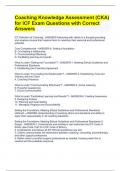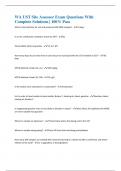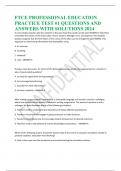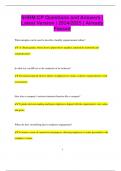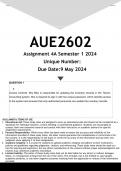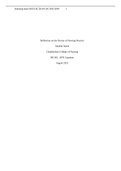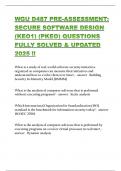Kathleen Gaillot
BT2107 Philosophy of Science
RSM Erasmus University
2020 - 2021
IBA Y1 & Pre-Master IBA
Notes primarily based on lectures &
recommended literature:
Introduction to the Philosophy of the Management
Sciences by T. van Willigenburg (2012).
ISBN: 978 90 8666 265 4
Teacher: Dr. Yu Liu
Phone: 010-408-2624
Email:
Summary & Notes
Philosophy of Sci 1
, Table of Contents
Theme 1: Empirical Explanation .....................................1 4.2 Quiz Week 4 .......................................................22
Course 1: Introduction ....................................................1 Theme 2: Theoretical Explanation ................................23
1.1 Philosophical Thinking .........................................1 Course 5: Rational Choice Theory .................................23
1.1.1 Scientific Research .......................................1 5.1 Level & Nature of Analysis in Social Sciences ....23
1.1.2 Characteristics of Scientific Knowledge .......1 5.2 Hermeneutics: Art of Interpretation..................23
1.1.3 Lecture: Philosophical Thinking ...................2 5.3 Rational Choice Theory Explained .....................24
1.2 Philosophy of Management Science ....................3 5.4 Application of Choice Theory: Game Theory .....24
1.2.1 Misconceptions Regarding its Methods ......3 5.4.1 Agents & Actors .........................................24
1.2.2 Misconceptions Regarding its Nature..........3 5.5 Problems & Individual Motives ..........................24
1.2.3 The Good Reason Model of Truth ...............4 5.6 Four Types of Research in Social Sciences .........25
1.2.4 Idealism Vs Realism. ....................................5 5.7 Lecture: Intro to Meta-Theories ........................25
1.2.5 Lecture: Philosophy of Management ..........6 5.8 Lecture: Rational Choice Theory........................26
1.3 Lecture: Social Ontology and Epistemology ........6 5.8.1 Lecture: Game Theory ...............................27
1.4 Lecture: Logic .......................................................7 5.8.2 Lecture: Agency Theory .............................28
1.5 Quiz Week 1 .........................................................8 5.9 Quiz Week 6 .......................................................30
Course 2: Language of Science .......................................9 Course 6: Function & Systems Theory ..........................31
2.1 Enlightenment: Rationalism & Empiricism ..........9 6.1 Methodological Collectivism & Macro Levels ....31
2.2 Positivism as an Extreme Form of Empiricism .....9 6.2 Systems Theory (Functionalism) ........................31
2.2.1 Lecture: Birth of Logical Positivism ..............9 6.2.1 A Functionalist Explanation of Crime.........32
2.2.2 Lecture: Logical Positivism & System of 6.2.2 Problems: Assumptions & Metaphysics ....32
Knowledge ..........................................................11 6.3 Symbolic Interactionism ....................................32
2.3 The Induction Problem ......................................11 6.3.1 Normativity Presupposes Fallibility ...........33
2.3.1 Lecture: Problem 1 Theoretical Concepts .12 6.3.2 Interpretation ............................................33
2.3.2 Lecture: Problem 2 Induction ....................13 6.3.3 Symbolic Interactionism: Norms ...............33
2.4 Two Models of Truth..........................................13 6.4 Lecture: Social System Theory ...........................33
2.4.1 The Correspondence Truth ........................13 6.4.1 Coleman’s Bathtub model of explanation .34
2.4.2 The Correspondence Theory of Truth .......14 6.4.2 Organizational Ecology ..............................35
2.5 The Standard Model of the Sciences .................14 6.4.3 3 Issues with Functional Explanation.........35
2.5.1 Coherence & Empirical Cycle .....................14 6.5 Lecture: Epistemology of Understanding ..........36
2.5.2 Lecture: Adjustment to Logical Positivism 6.5.1 Hermeneutics ............................................36
Model ..................................................................14 6.5.2 Social Meaning...........................................36
2.6 Quiz Week 2 .......................................................15 6.5.3 Social Construction of Market Value .........37
Course 3: Verification Versus Falsification....................16 6.6 Lecture: Conclusions & Implications of Meta-
3.1 Popper’s Critical Rationalism .............................16 Theories ...................................................................38
3.1.1 Lecture: Critical Rationalism ......................16 6.7 Quiz Week 6 .......................................................39
3.1.2 Lecture: The Quine-Duhem Thesis ............17 Course 7: Wrap Up & Examination ...............................40
3.2 Quiz Week 3 .......................................................19 7.1 Lecture: Research Strategy ................................40
Course 4: The Ideal of Positive Science ........................20 7.1.1 Methodology .............................................40
4.1 Scientific Paradigms & Revolutions ...................20 7.2 Examination Information ...................................41
4.1.1 Lecture: Thomas Kuhn’s Theory of
Paradigms ...........................................................20
Note: if short on time, use CTRL + F to locate (sub)chapter with the prefix Lecture. These cover the recorded content provided by the lecturer, as well
as visual aid obtained from the Lecture PDFs. Courses 1 through 7 contains ii the entire weekly content (book ‘pre-readings’ chapters, lectures, quiz).
There are overlaps between book content & lectures, no content is left out, consequently you may find similar topic in more than one location.
, Theme 1: Empirical Explanation
Course 1: Introduction
Chapter 1: Why philosophy of Science? P.7-35
1.1 Philosophical Thinking
1.1.1 Scientific Research
Philosophy of Science: discipline of questioning the pretences of the natural & social sciences.
The basic question in philosophy of science is why scientific knowledge is more trustworthy than everyday knowledge.
Calling knowledge or a view “Scientific” enhances its selling power as opposite to mundane, every-day knowledge.
Management Studies are a species of social science: they do not examine natural phenomena, but social phenomena
(people - individually or collectively), like the way organisations operate or the way markets function.
Empirical Management Studies collect data about the behaviour and beliefs of individuals, about the performance of
companies, and about the features of the environments in which companies operate.
This data is used by scholars to determine correlations (i.e. between forms of governance & performance)
Management Sciences collects knowledge on: social, economic, institutional and psychological patterns,
regularities (structures) & laws.
Management sciences are not company-specific – they aim for principles/patterns that are valid in general: that are
generalisable. Generalisability wants to explain and understand phenomena. (i.e. understanding the mechanisms that
explain success; what are the conditions?). Scientific research, with generalisability in mind, aims to establish general
claims about law-like mechanisms that help understand & explain complex processes/events/phenomena. (e.g.:
Wanting to establish the “fanciest restaurant in town”: this research may begin with looking into the concept of ‘fancy’;
what does it mean? Visiting & comparing other restaurants labelled as ‘fancy’ can help understand the general social
& psychological laws of fanciness. (=scientific research)
Management Sciences follows the line of thinking that everything that happens in & around businesses is contingent
(subject to chance, or dependent to particular circumstances) – it has no clear mechanisms, regularities or laws to show
the path to successful management. It is not very important what the management does, as long as it believes in what
it does. Any can be successful. This is why management trends work and are fashionable – until a new management
guru comes around.
Scientific research is characterised by the fact that it can be tested.
Results, and the techniques to reach them, must be controllable and repeatable. This brings trustworthiness.
● Data should be explicit; ● Arguments supporting the scientific result should be clear.
● Together, they allow one to check whether the raw data was interpreted correctly & conclusion are warranted.
1.1.2 Characteristics of Scientific Knowledge
Scientific Knowledge has five features (Characteristics for it to be trustworthy):
(1) Generalisability: to explain & understand phenomena
(2) Controllability: the research has to be transparent & repeatable
(3) Objectivity: should not be biased; not a matter of taste nor dependent on the popularity of a theory
o Good researchers should distance themselves from their clients/financiers which could influence the
research towards what they want to hear. The research should be independent of external pressures.
1


